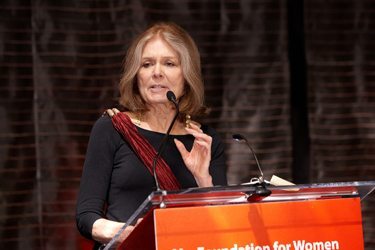Feminist Thought Leadership and its Influence on Public Policy Efforts
This Women's History Month, it's important to recognize thought leadership from feminists like Gloria Steinem, Audre Lorde, and Selma James that has demonstrably influenced current feminist policy efforts.

With the release of Sheryl Sandberg’s much-debated new book, Lean In: Women, Work, and the Will to Lead, it’s relevant to think about the impact of feminist writing, and how books written by feminists decades ago can help influence current activism and policy efforts.
Though it may not always be apparent, feminist writing does sometimes influence public policy discussions. Books, essays, and poems by writers like Gloria Steinem and Audre Lorde have shaped how advocates think about improving women’s economic status. Many feminists today are working to promote paid family leave, pay equity, domestic workers’ rights, higher wages, and health care for all—policies that disproportionately benefit less wealthy women and their families.
“Poor women and women of Color know there is a difference between the daily manifestations of marital slavery and prostitution because it is our daughters who line 42nd Street. If white American feminist theory need not deal with the differences between us, and the resulting difference in our oppressions, then how do you deal with the fact that the women who clean your houses and tend your children while you attend conferences on feminist theory are, for the most part, poor women and women of Color? What is the theory behind racist feminism?”
Lorde’s point about “the women who clean your houses and tend your children” is being addressed by the robust and growing movement for domestic workers’ rights—a movement that has resulted in the first-ever statewide bill of rights, enacted in New York, guaranteeing labor protections for nannies, caregivers, and housekeepers. The domestic workers’ movement is also active in California and is emerging in several other states as it grows throughout the world.
In a similar vein, feminist-Marxist activists Selma James and Maria Dalla Costa wrote an exciting pamphlet in 1972 called “The Power of Women and the Subversion of Community,” in which they point out the critical role domestic labor plays in the economy while not being valued by capital markets. I quoted the following selection in a piece for Jacobin last month:
“Serving men and children in wageless isolation had hidden that we were serving capital. Now we know that we are not only indispensable to capitalist production in those countries where we are 45% of their waged labour force. We are always their indispensable workforce, at home, cleaning, washing and ironing; making, disciplining and bringing up babies; servicing men physically, sexually and emotionally.”
Feminism’s influence on today’s activism is very real. Though a wider audience may find Steinem, Lorde, James, and Dalla Costa radical, these women carry deeper credibility among activists who are fighting today for the policies described above. It is these, and many other, writers’ thinking that is at the core of current movements for economic justice and improving women’s economic status.

